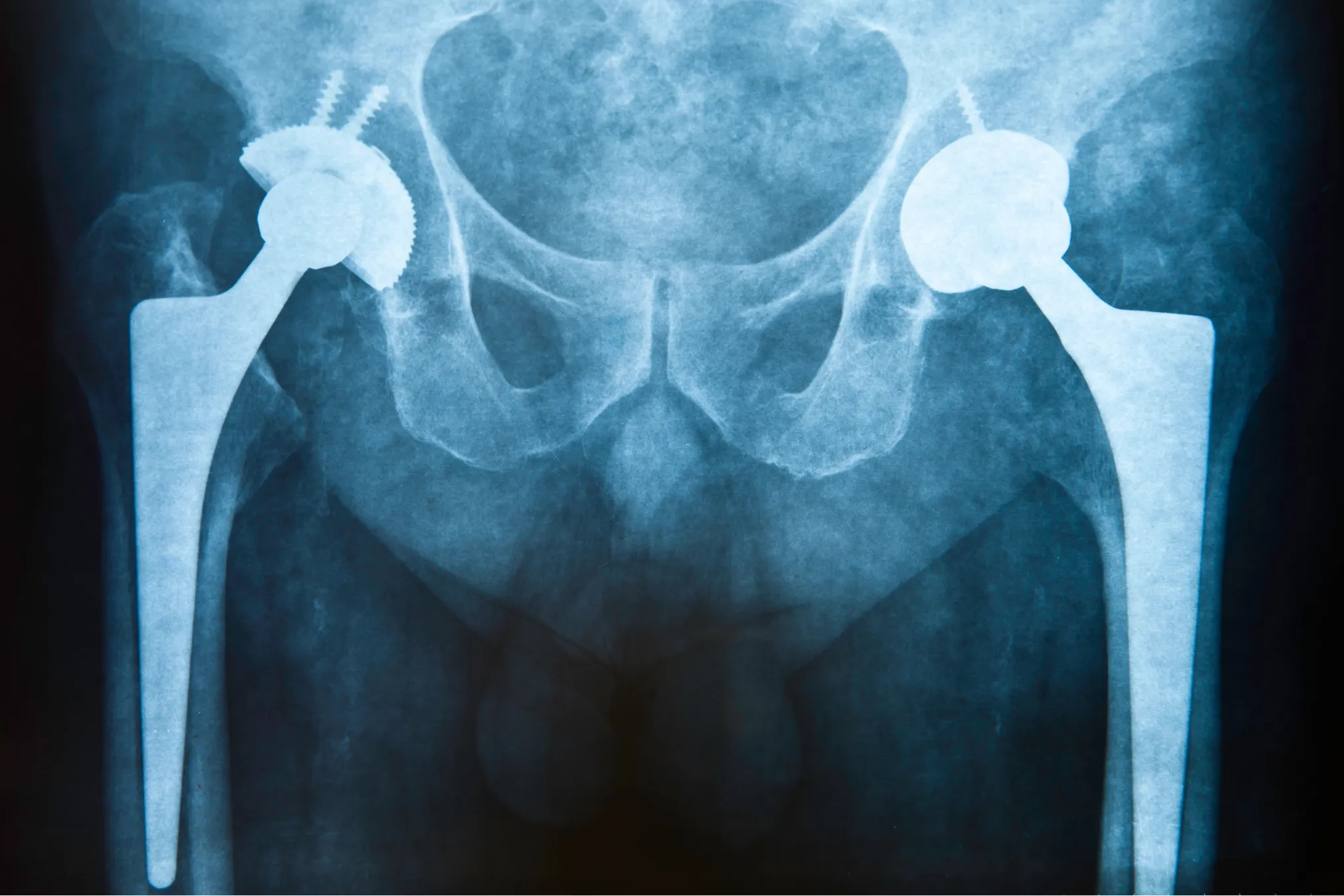
Revision Hip Replacement
- Revision Hip Replacement
- What is Revision Hip Replacement?
- Why Might You Need a Revision Hip Replacement?
- Signs You May Need a Revision Hip Replacement
- What to Expect During a Revision Hip Replacement
- Risks and Benefits of Revision Hip Replacement
- Why Choose Louisville Hip & Knee Institute for Revision Hip Replacement?
- FAQs
What is Revision Hip Replacement?
Revision hip replacement, also called revision arthroplasty, is a surgical procedure performed to replace or repair a failed or complication-prone previous hip replacement. While primary hip replacements are highly successful, wear and tear, infection, or mechanical issues may necessitate revision surgery to restore proper function and relieve pain.
Why Might You Need a Revision Hip Replacement?
A revision hip replacement may be required for several reasons:
- Wear and Tear: Over time, the prosthetic components of a hip replacement can wear down, particularly the polyethylene (plastic) liners between the metal parts.
- Loosening or Instability: The artificial joint may become loose or unstable, leading to pain and difficulty walking.
- Infection: An infection in the joint can damage surrounding tissue and compromise the implant’s function.
- Fractures: Bone fractures near the implant can destabilize the prosthesis.
- Dislocation: A dislocated hip may require surgical intervention if it becomes a recurring issue.
- Metal-Related Issues: Corrosion or reactions to metal debris from certain types of implants can cause complications.
Signs You May Need a Revision Hip Replacement
Common symptoms indicating the need for revision surgery include:
- Persistent pain in the hip or groin
- Swelling or redness around the joint
- Reduced range of motion
- Difficulty standing or walking
- Joint instability or a sense that the hip is “giving out”
- Audible clicking, grinding, or popping sounds from the hip joint
If you’re experiencing any of these symptoms, it’s important to consult with an orthopaedic specialist to determine the best course of action.
What to Expect During a Revision Hip Replacement
Revision hip replacement surgery is more complex than primary hip replacement because it involves removing old components and addressing damage to surrounding bone or soft tissue.
Pre-Surgical Assessment
- Comprehensive Evaluation: Imaging studies like X-rays, CT scans, or MRIs will help identify the problem.
- Blood Tests: These are used to check for infection or inflammation.
- Customized Surgical Plan: Your surgeon will develop a detailed plan based on your needs and health condition.
Surgical Procedure
- Removal of Old Implant: The surgeon carefully removes the worn or damaged prosthetic components.
- Bone Reconstruction: Bone grafts or specialized implants may be used to rebuild damaged bone.
- Insertion of New Components: A new prosthetic joint is placed to restore mobility and alleviate pain.
- Closure: The surgical site is closed, and you will be taken to recovery.
Post-Surgical Recovery
- Some revision hip replacements require a hospital stay of 2-3 days.
- Physical therapy begins shortly after surgery to improve strength and mobility.
- Recovery time varies but typically spans 3-6 months, depending on the complexity of the procedure and your overall health.
Risks and Benefits of Revision Hip Replacement
Benefits:
- Relieves chronic hip pain
- Restores joint function and stability
- Improves quality of life by enabling a return to daily activities
Risks:
- Infection
- Blood clots
- Bone fractures during surgery
- Implant loosening or failure over time
Your orthopaedic surgeon will discuss these risks and benefits in detail to ensure you’re fully informed.
Why Choose Louisville Hip & Knee Institute for Revision Hip Replacement?
Louisville Hip & Knee Institute helps patients who need revision surgery after hip or knee replacements. Our orthopaedic surgeons use advanced tools to diagnose and treat joint problems. We guide you through each step – from evaluation to recovery – focusing on your comfort and return to daily activities.
If you have pain from a previous hip replacement or ongoing joint issues, we can help. Call us to schedule an appointment and learn about your treatment options.
FAQs
How is a revision hip replacement different from a primary hip replacement?
Revision hip replacement is more complex than a primary hip replacement. It involves removing the original implant, repairing damage to the bone or tissue, and placing new components. The surgery may take longer and require a more detailed recovery plan.
How do I know if I need a revision hip replacement?
You may need revision surgery if you experience ongoing pain, instability, or difficulty walking after a hip replacement. Other signs include swelling, redness, or noises from the joint. Your doctor will use imaging tests and other evaluations to confirm if revision surgery is needed.
Are there alternatives to revision hip replacement?
Physical therapy, medications, or joint injections may temporarily relieve symptoms. However, these treatments do not fix structural problems with the implant. Your doctor will discuss the best approach for your condition.
How long do revision hip replacements last?
A revision hip replacement can last many years, often 10-20, depending on the materials, surgery quality, and how well you care for the implant. Following your doctor’s guidance can help extend the implant’s lifespan.
What can I expect during recovery?
Recovery from a revision hip replacement usually takes 3-6 months. Physical therapy helps improve strength and mobility. Assistive devices, such as crutches or a walker, may be needed during the early recovery period.
Will I be able to return to normal activities?
Many patients return to daily activities, such as walking and light exercise, after recovery. High-impact activities, like running, may not be recommended to protect the new implant. Your surgeon will provide specific instructions based on your needs.
Does insurance cover revision hip replacement?
Most insurance plans, including Medicare, cover revision hip replacements if they are medically necessary. Contact your insurance provider to confirm coverage and any required preapprovals.
What can I do to prepare for revision hip replacement surgery?
Preparation may include improving your overall health, stopping certain medications, and arranging for help during recovery. Your doctor may also recommend prehabilitation to strengthen muscles and improve mobility before surgery.
What are some warning signs to watch for after surgery?
After surgery, contact your doctor if you notice signs of infection, such as fever, redness, or drainage at the incision site. Other warning signs include leg swelling, chest pain, or shortness of breath.




